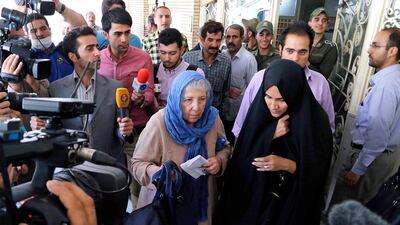NEW YORK // A verdict in the case against Jason Rezaian, a Washington Post journalist detained in Iran for over a year, will be announced "within a week", his lawyer said on Monday.
Rezaian was detained last May on espionage charges, along with his wife Yeganeh Salehi, Iran correspondent for The National.
Rezaian’s trial, held in Tehran, ended on Monday and his lawyer, Leila Ahsan, said she did not expect further hearings unless an appeal needs to be made following the verdict. She expected Salehi and a third unnamed defendant to face court proceedings after his verdict is announced.
“The verdict for Mr Jason Rezaian will be delivered and her [Salehi’s] trial and the third person’s will be later,” Ms Ahsan said.
She was finally able to present her client's defence during Monday's closed-door hearing, the fourth since May in a case that has been condemned by US president Barack Obama, the Post and the Committee to Protect Journalists as based on false charges and trumped-up evidence.
“The verdict will be issued and communicated to us within a week,” Ms Ahsan said. “I expect my client to be acquitted, as he is completely innocent.”
The Rezaian family has said that the judge had not followed Iran’s own laws during the trial, and Ms Ahsan alluded to the possible use of secret evidence by the prosecution. “In the courtroom, I strongly rejected the contention that there is ‘secret evidence’ only shared with the judge and prosecution,” she said. “By Iranian law, only evidence in the case file can be used against my client.”
Rezaian, 39, a native Californian with dual US-Iranian citizenship, was arrested last July at his home in Tehran along with Salehi, and two photojournalists. He has been held in Evin prison since then, much of his detention spent in solitary confinement, while Salehi was released on bail in October and has been ordered to not speak publicly, work or leave the country.
It is unclear whether Salehi, 30, will face trial for the charges against her, and a separate trial likely hinges on the outcome of Rezaian’s, according to his brother, Ali Rezaian. She has been at the revolutionary court sessions along with Rezaian’s mother, Mary Rezaian, but has not been allowed to view the proceedings.
On Monday, Ms Rezaian, standing with Salehi, told reporters outside the courthouse that her son is “paying the price of the suspicion, the animosity and the paranoia between the two countries” and that his case had become politicised. “If the judiciary is really independent, let them organise a public trial and prove whether my son has done anything wrong,” she said. “They cannot prove that he is a spy as there is no evidence.”
The charges, which include spying, hostile acts against the state and spreading propaganda, were not disclosed to Rezaian or his lawyer until just before the trial began, and are likely based on purported evidence taken from the couple’s computers after they were detained.
Ali Rezaian has said that the possible evidence includes a form letter from the Obama administration in response to a job application Rezaian submitted in 2008, and a visa application for Salehi that the couple submitted to the US embassy in Abu Dhabi. The application requested an expedited process, citing the potentially dangerous climate for journalists in Iran, and may be the “evidence” for the propaganda charge, according to Ali Rezaian.
Rezaian and his family maintain his complete innocence and Ms Ahsan has said the charges are baseless, although she is legally prevented from speaking about any details of the trial. If convicted, Rezaian will reportedly face up to 20 years in prison. Not date was given for when the verdict will be announced by judge Abolghassem Salavati, who has been sanctioned by the European Union for the harsh sentences he has given to journalists and reformists.
While Rezaian wrote about Iranian society from a deeply sympathetic perspective, and indeed faced criticism from US conservatives for portraying Iran in what they considered to be an overly positive light, the reporter may have become a victim of political jockeying between hardliners and the more liberal elected government of President Hassan Rouhani, who seems to have been taken by surprise at Rezaian’s arrest.
Other observers suspect that Rezaian was being used to leverage Iran’s position in the recently concluded negotiation’s over Tehran’s disputed nuclear programme with the US and world powers. After a long delay his trial began just as the negotiations were entering their final stretch. The head US negotiator, secretary of state John Kerry, said Rezaian’s case — and those of other US citizens detained in Iran — had been brought up on the sidelines of every round of negotiations, but was not tied to them in any way.
Last month, Mr Obama said that he was “not going to relent” until Rezaian and the other Americans were freed, and their chances could be better now that a deal has been successfully reached, though that is far from certain.
The Washington Post has increased its criticism of Tehran over the detention, and last month made a formal request for an expedited inquiry into the case by the UN Human Rights Council's working group on arbitrary detention to raise the pressure on Iranian officials.
The Post's executive editor, Martin Baron, on Monday said the "sham trial" had ended and called on Iranian authorities to free Rezaian and drop the charges against Salehi.
"After just four secret hearings in 10 weeks, the sham trial of the Washington Post's Jason Rezaian has ended in Tehran, but it remains unclear even to Jason's lawyer what might happen next," Baron said in a statement. He added: "Now is the time for Iran's senior leaders to end this 'judicial process,' with its sick brew of farce and tragedy. Jason and his wife, Yeganeh, who has been out on bail, deserve to be exonerated and to be given back their freedom and lives."
tkhan@thenational.ae
* with additional reporting from Agence France-Presse

